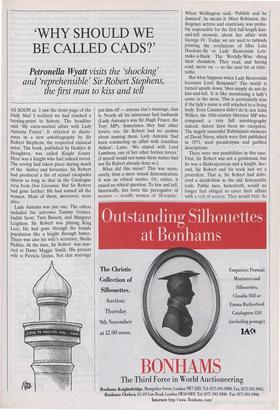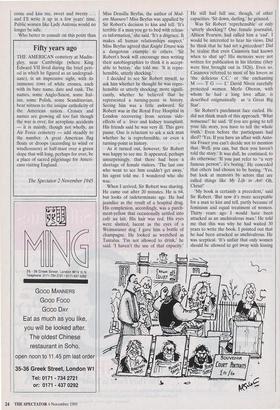WHY SHOULD WE BE CALLED CADS?'
Petronella Wyatt visits the 'shocking'
and 'reprehensible' Sir Robert Stephens, the first man to kiss and tell
Lady Antonia was just one. The others included the actresses Tammy Grimes, Judith Scott, Tarn Bassett, and Margaret Leighton. Sir Robert was playing King Leer. He had gone through the female population like a knight through butter. There was also his wife's secretary, Sheila Pickles. At the time, Sir Robert was mar- ried to Dame Maggie Smith. His present wife is Patricia Quinn. Not that marriage put him off — anyone else's marriage, that is. Nearly all his mistresses had husbands (Lady Antonia's was Sir Hugh Fraser, the Tory MP). Sometimes they had other lovers, too. Sir Robert had no qualms about naming them. Lady Antonia 'had been conducting an affair with Jonathan Aitken'. Later, 'We stayed with Lord Lambton, one of her other former lovers.' (I myself would not name these names had not Sir Robert already done so.) What did this mean? This was more, surely, than a mere sexual demonstration. It was an ethical matter. Or, rather, it raised an ethical question. To kiss and tell, historically, has been the prerogative of women — usually women of 'ill-repute'. When Wellington said, 'Publish and be damned', he meant it. Mary Robinson, the Regency actress and courtesan, was proba- bly responsible for the first full-length kiss- and-tell memoir, about her affair with George IV. Today, we are used to tabloids printing the revelations of Miss Lulu Hardone-By or Lady Bienvenida Lets- make-a-Buck. The Worldly-Wise shrug their shoulders. They read, and having read, move on — to the next bit of tittle- tattle.
But what happens when Lady Bienvenida becomes Lord Benjamin? The world is turned upside down. Men simply do not do kiss-and-tell. It is like mentioning a lady's name in the mess. This is particularly true if the lady's name is still attached to a living body. Even Casanova didn't do it; nor John Wilkes, the 18th-century libertine MP who composed a very full autobiography indeed. Actors have been no exception. The hugely successful Rabelaisian memoirs of David Niven, which were first published in 1971, used pseudonyms and garbled descriptions.
There were two possibilities in this case. First, Sir Robert was not a gentleman, but he was a Shakespearean and a knight. Sec- ond, Sir Robert and his book had set a precedent. That is, Sir Robert had deliv- ered a death-blow to the old, honourable code. Public men, henceforth, would no longer feel obliged to cover their affairs with a veil of secrecy. They would blab. So come and kiss me, sweet and twenty . . . and I'll write it up in a few years' time. Public women like Lady Antonia would no longer be safe.
Who better to consult on this point than Miss Drusilla Beyfus, the author of Mod- ern Manners? Miss Beyfus was appalled by Sir Robert's decision to kiss and tell. 'It's terrible if a man you go to bed with releas- es information,' she said. 'It's a disgrace. It makes all human relationships suspect.' Miss Beyfus agreed that Knight Errant was a dangerous example to others. 'Sir Robert's book will encourage men writing their autobiographies to think it is accept- able to betray,' she told me. 'It is repre- hensible, utterly shocking.'
I decided to see Sir Robert myself, to ask him whether he thought he was repre- hensible or utterly shocking; more signifi- cantly, whether he believed that he represented a turning-point in history. Seeing him was a little awkward. Sir Robert was in the Royal Free Hospital in London recovering from serious side- effects of a liver and kidney transplant. His friends said he was very ill. This gave pause. One is reluctant to ask a sick man whether he is reprehensible, or even a turning-point in history.
As it turned out, however, Sir Robert was happy to see me. It appeared, perhaps unsurprisingly, that there had been a shortage of female visitors. 'The last one who went to see him couldn't get away,' his agent told me. I wondered who she was.
When I arrived, Sir Robert was shaving. He came out after 20 minutes. He is 64, but looks of indeterminate age. He had jaundice as the result of a hospital drug. His complexion, accordingly, was a parch- ment-yellow that occasionally settled into café au lait. His hair was red. His eyes were slanted, lucent as the eyes of a Weimaraner dog. I gave him a bottle of champagne. He looked as wretched as Tantalus. 'I'm not allowed to drink,' he said. 'I haven't the use of that capacity.' He still had full use, though, of other capacities. 'Sit down, darling,' he grinned.
Was Sir Robert 'reprehensible' or only `utterly shocking'? One female journalist, Allison Pearson, had called him a 'cad'. I would be interested to hear his views. Did he think that he had set a .precedent? Did he realise that even Casanova had known when to shut up? His memoirs were not written for publication in his lifetime (they were first brought out in 1826). Even so, Casanova referred to most of his lovers as `the delicious C.C.' or 'the enchanting M — T G — I.' David Niven carefully protected women. Merle Oberon, with whom he had a long love affair, is described enigmatically as 'a Great Big Star'.
Sir Robert's parchment face curled. He did not think much of this approach. 'What nonsense!' he said. 'If you are going to tell your life story, you have to tell the whole truth.' Even before the participants had died? 'Yes. If you have an affair with Anto- nia Fraser you can't decide not to mention that. Well, you can, but then you haven't told the story.' It was dull, he continued, to do otherwise: 'If you just refer to "a very famous person", it's boring.' He conceded that others had chosen to be boring. 'Yes, but look at memoirs by actors that are called things like My Life in Art! Oh, Christ!'
`My book is certainly a precedent,' said Sir Robert. 'But now it's more acceptable for a man to kiss and tell, partly because of feminism and equal treatment of women. Thirty years ago I would have been attacked as an unchivalrous man.' He told me that this was why he had waited 30 years to write the book. I pointed out that he had been attacked as unchivalrous. He was sceptical. 'It's unfair that only women should be allowed to get away with kissing and telling. Why should men like me be called cads? Women can't have it all their own way. They dish it out, but they won't take it.'
This was all very well, but had Sir Robert consulted any of the women before writing? Had he given them a chance to `take it'? Had he asked Lady Antonia, for instance? 'No, I didn't consult them. What an idea!' Had any of them complained? `Not yet, but then the book's only just come out.' In any case, he did not think they had reason for complaint. 'I wasn't nasty about any of them. Look, Antonia might have minded 25 years ago, but why should she now?'
But surely Sir Robert's current wife minded? Would any wife wish to be pub- licly reminded of her husband's old lovers? Sir Robert told me that she had read the book. Not only that, but had thoroughly enjoyed it. 'Patricia was delighted by it. She thought it was a very good read,' he said. 'Why shouldn't she?'
By now it was quite clear that Sir Robert did not see himself as at all 'reprehensi- ble', or 'utterly shocking'. He seemed, rather, positively righteous, a preacher of truth. `Do you really think I should have written about my political views instead?' he asked me. 'Who gives a shit about my views on Bosnia? Not the Bosnians. It's all hypocritical pomposity.' He propped him- self up on an elbow. 'No one would want to buy a book like that.' So, had we finally come to it? Such talk of truth was all very well, but truth is not always a convincing justification for dis- comfiting others. As Truman Capote remarked, 'Myself, I don't care what any- one says about me as long as it isn't true.' Did Sir Robert do it for the money? The parchment cracked from side to side. 'My publishers did say that scandal was good. At first they said the book wasn't scan- dalous enough.' He paused. 'But I don't think it will make me rich. Really. it wasn't money.' This time, he had gone too far. What would the publishing industry make of such a disclaimer? I telephoned one of its representatives, Miss Minna Fry, publicity director of Macmillan's. She insisted that money must have come into it some- where. It always did. 'Of course he did it for money. If you are a boring actor who has nothing else but a string of interesting lovers, it's a financial must,' she said. But did Sir Robert's memoirs mark a water- shed? Would publishers now be insisting that their male authors kissed and told, providing there was anything for them to tell. 'If women do it, there is no reason men can't,' she said. Miss Fry concluded, `There is no such thing as a gentleman any more.'
Sir Robert did not seem to care what she or anyone else thought. 'My book is quite the frankest of books,' he said, heaving himself up on his pillow. He then announced that he would 'quite like' to write another one. What was there left to say? Sir Robert assured me he that would find something or, rather, someone pour encourager les autres. Les autres male authors, that is, against those unreason- able, whingeing women. If Sir Robert is a turning-point in history, he is undoubted- ly turning off the distaff side. 'If they dish it out, these bloody women, they've got to learn to take it,' he repeated. Perhaps there was a moralist in Sir Robert after all.












































































 Previous page
Previous page